It’s no secret that I’m a big fan of goat cheese, but it’s not just the taste that I love.
Compared to cow dairy, goat milk also tends to be easier to digest! There is a bit of confusion surrounding the reasons why– with rumors that it is free of lactose or casein– so let’s set the record straight.
—
Here’s why goat milk is better for digestion:
1. Smaller Fat Molecules. The fat molecules in goat milk are shorter, making them easier for the body to assimilate. These smaller fat molecules are suspended throughout goat milk, making it “naturally homogenized,” while cow milk contains larger fat molecules that naturally separate and form the thick layer of cream found on top of non-homogenized milk.
The smaller the fat molecules, the easier they are digested, which gives goat milk a digestive edge.
—
2. Different Protein Structure. All types of milk contain casein proteins, but the composition of these proteins can vary greatly between different animals. Goat and sheep milks have a very similar protein structure, but when compared to the protein in cow milk, they both contain significantly less of the alpha S1 casein protein, which is associated with allergies.
In fact, this study suggests that goat milk may be a hypoallergenic alternative to cow milk, particularly for children:
“Goat milk as a substitute for cow milk was studied in 38 children during a 5 months period [33]. The children on goat milk surpassed those on cow milk in weight gain, height, skeletal mineralization, and blood serum contents of Vitamin A, calcium, thiamin, riboflavin, niacin and hemoglobin. Similar findings were obtained in studies with rats [34]. In French clinical studies over 20 years with cow milk allergy patients the conclusion was that substitution with goat milk was followed by “undeniable” improvements [33]. In other French extensive clinical studies with children allergic to cow milk, the treatment with goat milk produced positive results in 93% of the children and was recommended as a valuable aid in child nutrition because of less allergenicity and better digestibility than cow milk [33].”
—
3. Less Lactose. Goat milk contains slightly less lactose than cow milk (4.1 percent vs. 4.7 percent) which may give it a mild advantage when it comes to digestion. The fermentation process used to make cheese and yogurt also reduces the lactose, which explains why some people with lactose issues can enjoy certain fermented dairy products. The longer a cheese is aged, the less lactose it will contain.
—
Though it may not impact digestion, goat milk also offers 13% more calcium than cow’s milk, along with 25% more vitamin B-6, 47% more vitamin A, 134% more potassium and 350% more niacin. It is also higher in minerals like chloride, copper and manganese, and contains 27% more of the essential element selenium.
Note: I prefer to consume raw goat cheese, when possible, as the raw enzymes seem to help with the digestive process. The FDA requires that cheese made from raw, unpasteurized milk must be aged for 60 days to be considered “safe” for public sale in grocery stores, and this aging process allows the acids and salt found in cheese to naturally destroy harmful bacteria, without the use of heat.
—
My favorite aspect of goat dairy? It makes vegetables taste delicious! (And anything that makes me eat more vegetables is a good thing in my book.)
Some of my favorite ways to enjoy them together include:
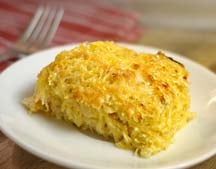
|

|
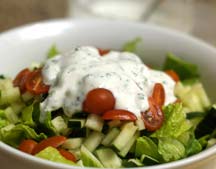
|
|
|
I hope this clears up any confusion, and encourages you to try goat or sheep versions of your favorite cheeses and yogurts, if you haven’t already!
—
Reader Feedback: Are you a fan of goat cheese?
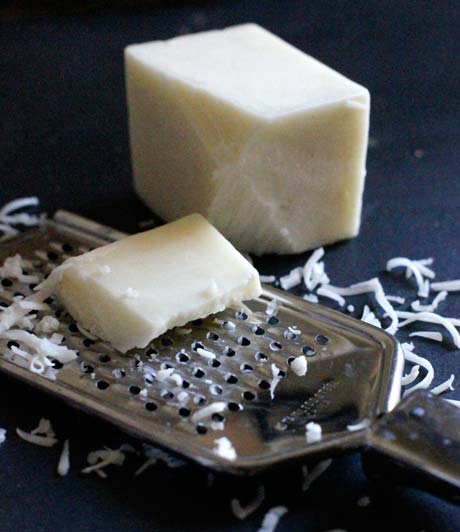
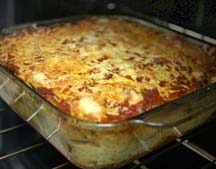

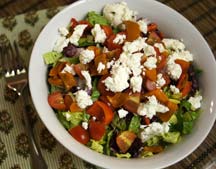

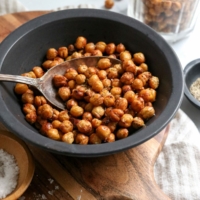
Hey, I HATE cheddar cheese so the only raw brand is cheddar any others you recommend thanks;)
Redwood Hills Farms makes an excellent raw goat feta, and there is always the popular chevre, which is a soft (pasteurized) goat cheese. My local Whole Foods Market carries goat mozzarella, too, which is the only type of goat cheese my husband likes.
THANKS:D!
love goat cheese! it is one cheese our bodies have seem to tolerate for years.
Manchego is a sheep cheese that also tastes delicious!
I’d love to be a bigger fan of goat cheese, but the game-y taste is off-putting to me. I can handle REALLY mild feta, and that’s about it. Wish I could get over it, though, as I am lactose intolerant.
You read my mind!! I bought some raw goat cheese this weekend and thought to myself, “hm, I wonder exactly why Detoxinista eats goat cheese” !! Thanks for this!
There are some dairy farms that have Guernsey and Jersey cows which produce milk that is much higher in the original type of casein that existed before the mutation.
i’m so glad you made this post. it drives me nuts when people say they do better with goat’s milk because it’s lactose free when it’s really the fat molecule size. i’ve explained this countless times to people and am sharing this on my wall so i don’t have to keep repeating myself haha
Thank you for this helpful post! I learned a lot through it & will try more types of goat cheese, now, as I enjoy experimenting :0). Chevre with honey is my favorite, so far :0).
I can understand that a smaller molecule would be easier in terms of permeability for digestion. but I don’t understand if that makes it better. Could you site the sources used?
I’ve been taught that faster digestion = better digestion, so it makes sense that smaller molecules will be digested faster, because the body doesn’t have to work as hard to break them down.
From Dr. Sears’ discussion on goat’s milk: “Goat milk protein forms a softer curd (the term given to the protein clumps that are formed
by the action of your stomach acid on the protein), which makes the protein more easily and rapidly digestible. Theoretically, this more rapid transit through the stomach could be an advantage to infants and children who regurgitate cow’s milk easily.” [source]
I’m a fan of goat’s milk too and once used to it cow’s milk tastes way too strong!
Well done on the research you quote. It is a little confusing to explain why goat’s milk seems easier on the digestion. I had always assumed that there was less cassein and was really surprised when I found there was usually rather more!
I think the smaller size of the fat molecules is probably the reason but as long as I can keep my fridge topped up I’m not too concerned.
🙂
Alex
Hi!
My now 2 1/2 year old had an immediate reaction to cow’s milk at 12 months. Vomiting, fever, diaper rash within only a few hours. We met with a pediatric allergist who diagnosed her with protein milk induced colitis even though the skin test did not show an allergy. He told me she would grow out of it most likely by 2 and to reintroduce it every 2 months. However, I have found two things..1. Raw cows milk has 0 effect on her and 2. Every new attempt at reintroducing grocery store organic cows milk seems to create more severe of a reaction each time. (I have sense been told that organic cows milk does not necessarily mean all the cows making up the milk are rBGH1 free) She has been on goats milk since 12 months and it works great for her! My dr did suggests we supplement with vitamin D drops? Your thoughts? The one positive from all of this has made me find blogs like yours and really learn about our food supply!
Thanks Megan.
Interesting that the skin test was negative. It is a crude test though and her reaction was clear – her body does not like it. so I would ignore advice to reintroduce it, I would take her reaction seriously and she may not grow out of it either, despite the standard somewhat patronising advice!
Not sure why she needs vitamin D but I am very keen on clever supplementation so I would go ahead and use http://www.ddrops.ca/ddrops-kids.php which you can also get from Amazon.
BTW this does not mean that she is allergic to cheese or yogurt. Allergies are funny beasts and are very idiosyncratic.
I wonder why she is allergic of course – maybe when she is a little older you could get a “Gut Permeability” Test – very simple and non intrusive – this could rule out or in the possibility that she has “Leaky Gut” which is generally pretty easy to fix.
No surprise at all that Raw milk works on her!
All My Best
Alex
I love your site and all the vegan ideas that I found — you make a convincing case that goat cheese is absolutely better for digestion. But what about other health concerns, like the links between casein and cancer according to the China Study? Is it a question of degree, i.e. less casein protein in sheep and goat dairy, more casein protein in cow dairy?
i second this! casien=cancer
kimberly snyder says dairy is not a beauty food for digestion
I definitely don’t consider goat dairy a health generator; I just wanted to explain why it might make a better alternative for those who already consume cow dairy. I think goat cheese makes a great transition tool for those who are trying to adapt a healthier lifestyle, as it can encourage the consumption of more vegetables– and eating more vegetables is almost always a step in the right direction! Kimberly Snyder includes goat dairy as an option in her book, The Beauty Detox Solution, for similar reasons.
Also, keep in mind that studies like The China Study aren’t taking into account the full picture of any given food– when you isolate a single element, like casein, those results don’t necessarily reflect the results of all foods that contain casein, because those foods also contain many other elements that work synergistically together. For example, the other milk protein, whey, has been shown to suppress tumor growth, but T. Colin Campbell’s research didn’t take that into account. In fact, a similar Indian study done in the 1980s (using monkeys, instead of rats, exposed to a more reasonable dose of aflatoxin when compared to Campbell’s study) had the exact opposite results– the monkeys exposed to more casein protein actually had a lower incidence of cancer compared to the rats exposed to less casein. Another one of Campbell’s studies, which he chose to omit from his book, showed that wheat gluten can create similar results to the casein protein– suggesting that perhaps a complete amino acid profile, regardless if it’s plant or animal sourced, promotes cell growth, and those can be healthy cells or cancer cells. This is why I prefer to look at food as a whole, rather than trying to isolate certain elements, which may not provide the whole picture.
Again, I personally don’t think dairy is a health generating food, but I do think it can be enjoyed in moderation in the context of an overall vegetable-centric diet. Hope that helps clear things up!
Hi Amuk (and Cel),
I realize I’m a little late to the party, but I saw your comment(s) and had to chime in. While at first glance it may seem Dr. Campbell’s claim concerning the carcinogenic effects of casein on the body is perfectly legit, one needs to understand that there are two little known factors regarding that claim which affect it greatly. In this sense, he is both right and wrong.
First, it’s important to note that the lab rats to which he fed the casein ALREADY had cancer when he began feeding it to them (he, in fact, induced it himself…for whatever reason). The casein, then, did not CAUSE the cancer, it simply sped its progression.
Secondly (and perhaps more importantly), the casein which Dr. Campbell used in his study was from pasteurized milk produced by commercially raised (aka SEVERELY mistreated) dairy animals. These animals probably never spent a day in their lives grazing on grass the way that they’re designed to, which in turn would have, of course, make for some awfully nutritionally deficient milk. Also, it’s important to realize that milk is a very delicate substance, so as far as pasteurization is concerned, it in itself is so damaging to milk that it completely changes the milk’s chemical structure and turns it into a foreign substance–one that is unnatural and completely unrecognizable by our bodies.
Taking these two factors into account, it’s easy to see why the casein stimulated growth of the rats’ cancer cells. It’s also completely fair to say that Dr. Campbell was correct in his claim. However, I am of the knowledge that he (again, for whatever reason) didn’t proceed to disclose in his study that the casein from raw milk produced by humanely raised, grass-fed animals likely has no carcinogenic effect whatsoever. Most people don’t realize the HUGE difference there is between commercially produced pasteurized milk and raw milk from properly treated animals. Just ask someone with a lactose sensitivity who’s drank both! (My brother can’t even drink the pasteurized stuff–it causes reactions similar to asthma attacks. He has no problem with raw milk though! 🙂 )
Lastly, I have to agree with Megan in that when certain foods are viewed as a whole rather than as isolated parts it makes much more sense that the health risks/benefits will be accurately portrayed. (Take juicing for example–when juice is extracted from a given fruit/vegetable it causes the sugars within that fruit juice to become much more concentrated, which, when ingested, can in turn cause blood sugar spikes. When viewed in isolation, it would make sense to claim that fruit is unhealthy because it causes blood sugar spikes. However, we all know that when the fruit is eaten as a whole, the fiber that is paired with the sugar makes it perfectly digestible and healthy. I believe it is same way with milk.)
This article explains the Dr. Campbell/casein topic and The China Study in more detail if you’re interested:
http://www.weedemandreap.com/are-plant-based-diets-a-fad/
And these two articles have some great information on raw milk:
http://www.weedemandreap.com/drinking-raw-milk/
http://www.theprairiehomestead.com/2013/05/got-raw-milk-why-we-chose-to-go-raw.html
Thanks for the informative post. Do you consume goat milk? If so, where do you purchase it? I’ve only seen pasteurized in the store which is what I give to my kids on occasion in lieu of cows milk (we are not big ‘milk’ drinkers) but have not seen raw goat milk in any of my local health food stores (Sprouts, Mothers or Whole Foods)
Thanks!
I gave up all dairy 2 yrs ago due to hormonal issues and acne (My face cleared up instantly, BTW!)…also the breast cancer concern since my mother was diagnosed with hormonal breast cancer. I’ve never thought about researching other milk forms like goat to see if they would be any better (less hormones). I’ll be looking into this…I miss cheese! If there was one or two I could eat occasionally, that would be heaven. Thanks!!!
With your love of goat cheese, it must have been hard to give up during your pregnancy; the alternatives to eating it with a baby on board are scary through. Glad everything worked out and now you can enjoy your goat cheese with your child in hand.
Hi Megan, I’m a first time commentator here. Can you explain why casein proteins are so specifically bad for the body? Or, at least direct me to another post where you talk about the topic. I’m trying to understand caseins effect on the body better. Thanks! – Jeremy
Hi Jeremy,
I am of the knowledge and firm belief that casein is only harmful to the body when it is in (or comes from) commercially produced, pasteurized milk. Milk is a very delicate substance and pasteurization is so harsh that it completely denatures the proteins (casein and whey) within the milk, making them unrecognizable by our bodies. This is what causes problems–it wreaks havoc on our digestive system which in turn causes allergies, sensitivities, and other health complications (such as skin issues) to skyrocket.
Raw milk from humanely raised, grass-fed animals on the other hand is something our bodies can recognize and process, and (as long as it’s produced, handled, and stored properly) isn’t harmful to us in the least!
Here are two articles on raw milk you may enjoy:
http://www.weedemandreap.com/drinking-raw-milk/
http://www.theprairiehomestead.com/2013/05/got-raw-milk-why-we-chose-to-go-raw.html
I actually have a question reguarding your almond milk recipe. Would I be able to substitute peanuts for the almonds?
I personally don’t consume peanuts very often, but I don’t see why they wouldn’t work as a substitute in almond milk, if you want to try it.
I’d love to agree that goat’s milk is an alternative to cow’s milk however this is not the case for my 6 yo. Found over several months ago he has a casein intolerance so I switched to goat cheese for eggplant/pizza bites. He was so sick and I won’t gross you out with details. Thought it was something else and tried again and still the same problem so for now only non-dairy milk. It seems to affect me as well as I was diagnosed with casein intolerance 26 years ago. I love your website and the alternative ways to prepare foods. You have helped us enjoy food again.
Hi Megan!
I have tried goat’s cheese twice in the past, and though I tried to like it, I just DIDN’T! Perhaps the type/brand I ate was not the best or highest quality; I’m not really sure. Do you have any suggestions as to any kinds of goat’s cheese or milk I should try–maybe some that are milder, tasting more like cow’s milk–and where I could get them? I have heard that some breeds of goats (Alpines, for instance) produce milk that tastes very similar to cow’s milk. I enjoy cow’s dairy but have given it up until my family and I are able to begin purchasing it raw. I would really love to give goat’s dairy another try, I just know I need to play my cards right with what I choose so that I won’t be turned off again.
Thank you for your informative post! Blessings.
Hi Megan,
Besides breast milk, what is a good milk alternative for a one year old? Should I give her goats milk? I was planning on either almond or coconut. I just want to make sure she is getting the nutrients she needs without feeding her cow’s milk.
I’ve heard of people using a goat milk recipe to create formula-replacement, and I definitely think goat milk would be a better alternative to giving her cow milk, but it all comes down to your own personal discretion. I personally don’t plan on feeding my baby any other milk in the future as a beverage, but I also hope to have an extended breastfeeding relationship, so I don’t think any other milk is necessary. (Of course, we’ll see what really happens when we get to that point!) When it comes to offering our son smoothies or cereal in the future, we’ll probably use homemade almond milk or coconut milk in those types of things. Best of luck to you!
I bought raw goat cheddar cheese and absolutely love adding it to salads! Thank you for the suggestion! What is the best way to store it and how long does it last after opening? Thanks so much!
I’m glad you’re enjoying it! I store my opened cheese in a sealed glass container in the fridge, and use it up within the week.
I love your site and all the vegan ideas you suggest. I also love goat cheese so far.
The China Study did not only prove that cow milk is bad for you, it also proved that in areas where cow milk (even natural) was consumed in high quantity, were also the areas with high rates of cancer cases. If one component of a product is obviously proven to be extremely dangerous for your health, who cares if the other components are or aren’t dangerous. Let’s not debate this till the end of the world. Cow milk is bad for you. Period. Don’t try to advocate for something that can cause serious health problems to so many people.
May I simply just say what a relief to discover someone that actually knows what they are talking about online. You actually know how to bring an issue to light and make it important. A lot more people ought to look at this and understand this side of the story. It’s surprising you aren’t more popular given that you definitely possess the gift.
Goat Milk has negative effects on my gut. I have been suffering from IBS for 3 years. And goat milk is considered the main trigger of Irritable Bowel Syndrome.
I have severe stomach trouble I was told goat milk can help heal my gastroparesis (stomach dont empty well) is this true?